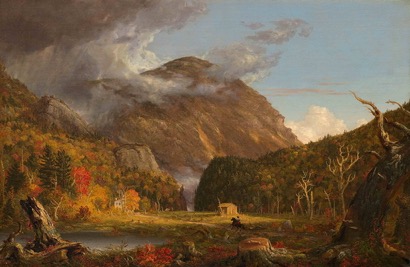SettlingInto

Thomas Cole: "A View of the Mountain Pass Called the Notch of the White Mountains" (1839)
"SettlingInto brings our souls and spirits into play."
Few human acts manage to feel as unsettling as settling. It seems inevitably disruptive. My own ancestors arrived on this continent in the 1620s, having bartered their seventeenth century lifestyle for something more closely resembling one common to the Dark Ages. A wattle hut, very likely hastily constructed from roughly-gathered forest scrub, probably sufficed for shelter through that first Connecticut winter or two. We now think of these people as valiant and brave, and they may have managed to become both, but they began their SettlingInto as essentially economic resources indentured to some land speculators rather than as simple, peace-loving Pilgrims. Religious liberties aside, they held deeper obligations to produce returns for rich shareholders or face ruin. They might have been seeking liberty, but only as a longer-term possibility. In the short term, they became essentially debt slaves as a precondition for their eventual freedom, so they first SettledInto fulfilling obligations, not enjoying newly-found freedoms. These duties sometimes conflicted with their high ideals, and relations with the locals only degraded over succeeding decades. Pilgrims were genuine sons of bitches when they felt that they needed to be to fulfill their financial obligations to gain their own freedoms. Little has changed over following centuries. ©2021 by David A. Schmaltz - all rights reserved
Taking alien country as if it was your own, even if you presumed it belonged to God and, by divine right, was passed down to you as his agent, seems one of the more audacious forms of liberty. SettlingInto seems inescapably audacious. It presumes much. When Just Visiting, one naturally behaves humbly. One understands that they do not possess the place they inhabit, and that their tenancy depends upon the perhaps unlikely and even unwarranted kindnesses of strangers. One lives one down from settling, never intending to outstay any welcome or unwelcome hostility. SettlingInto, though, asserts a coequal place at some table, just as if one rightly belonged there, the same as better-established earlier settlers. Therefore, the first stage of SettlingInto involves fulfilling the role of outsider, a stranger in one's own home, and this strangeness seems utterly different from the strangeness of strangers, which seems easy to overlook since their presence seems only temporary by custom. SettlingInto might serve as a threat to longer term inhabitants, who might rightly suspect that the presence of others could disrupt local custom and traditions. It usually does.
SettlingInto might superficially seem an act of simply kicking back, though it more often becomes one of at least nudging into, a barging into from some perspectives. Asserting presence risks rejection and might insist upon a necessary sensitivity to local customs. The tariff comes subtly if unavoidably. Dedication tests present themselves intending to determine if one's a them or an us, like antibodies probing for viruses. Time often erases initial concerns. Anyone SettlingInto learns to disconfirm initial suspicions through simple interaction. Isolation breeds suspicion and even The Prodigal Son easily breeds innocent enmity among his siblings upon his return, however warmly his father might welcome him. Time might heal wounds but it also further wounds all shitheels. Becoming one of us demands embracing thems as yours without allowing your own suspicions to undermine potentials. Your home is not your castle unless you're the type of asshole who insists that you're royalty.
Pride of place seems to come only after several rather too public humiliations. I never really met one neighbor until he caught me trying to dismember a storm-fallen tree with a big old manual bull saw. I was perfectly happy laboring away, but a neighbor found my behavior unthinkable, perhaps comical, so he showed up with a chain saw and reduced that tree to splinters in minutes. "Oh, by the way," he mentioned as he exited, "I'm Jim, your neighbor." He declared himself and I merely accepted with evident gratitude. We thereafter knew each other a little better than just to anonymously wave at each other. Another neighbor lost his carport in a windstorm. It landed on top of The Muse's car. He was all over himself embarrassed and we cheerfully reassured him, helping him replace it back where it belonged. We could have been angry with him, even rightfully threatened legal action, but to no useful end. Moments come when certain assertions cannot be deferred, though, and they come without bidding, to bushwhack you into showing what you're made of. I suspect that providence rules these intrusions. Your decency can't help but show then, if you hold decency inside you, but even foibles, which might be many, remain recoverable. Mistakes and trespasses can be easily addressed by just owning them. Contriteness cures most impositions.
The Muse and I have lived as strangers for the last twelve years. Largely invisible, we've been what movie directors call Atmosphere People, those without speaking parts or credits who fill in scenes to render them credible. I've been the guy turning into the produce stand in the second reel. The Muse has been another passenger filling space on the late Metro train north. I pulled into the Kiss and Ride Lot five minutes before that train arrived, a regular as clockwork passerby. Now we switch roles, SettlingInto less anonymous ones and not just for any director's audience, but mostly for ourselves. As Atmosphere People, our engagements seemed at most skin deep. SettlingInto brings our souls and spirits into play. We wonder how that might be for a change.


